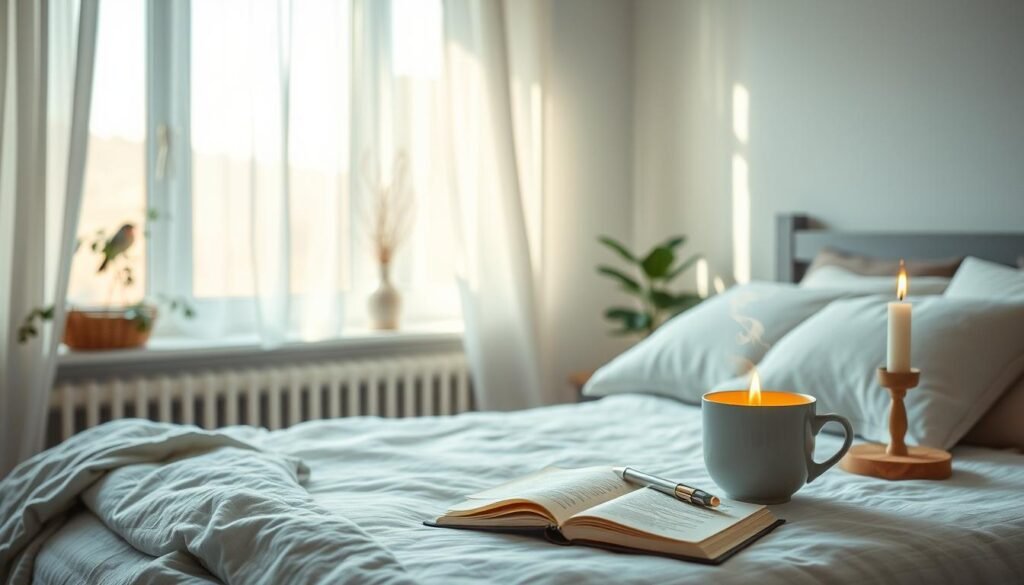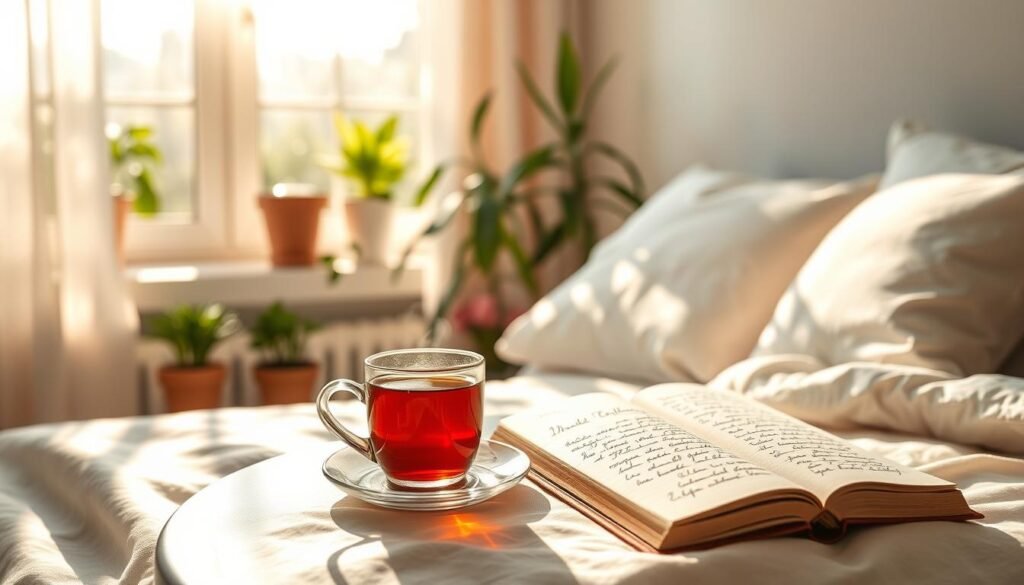About 40% of people wake up feeling anxious each day. This problem, known as morning anxiety, can make starting the day hard. But don’t worry, it’s possible to beat this. With the right approach, you can tackle morning anxiety. Experts suggest using different methods to help. This includes mindfulness and changing what you eat. By addressing the causes of anxiety, you can enjoy calmer mornings.
Key Takeaways
- Morning anxiety affects approximately 40% of individuals upon waking.
- It is rooted in elevated cortisol levels and can be linked to lifestyle factors like caffeine and alcohol consumption.
- Effective coping strategies include relaxation techniques and a structured morning routine.
- Understanding symptoms such as nervousness and trouble returning to sleep is crucial.
- Breaking the cycle requires patience, effort, and the implementation of positive habits.
Understanding Morning Anxiety
Morning anxiety is when you feel worried right after you wake up. It comes with certain symptoms of morning anxiety. These can affect how you feel all day. Knowing more about it can help you handle it better.
What is Morning Anxiety?
Morning anxiety happens soon after waking up. It’s caused by many things, including changes in hormones. Your body makes more cortisol, a stress hormone, in the morning. This may make you feel uneasy. You might have too many thoughts at once or find it hard to start your day.
Symptoms of Morning Anxiety
The symptoms of morning anxiety differ among people. Some common signs are:
- Increased heart rate
- Tremors or shaking
- Shortness of breath
- Difficulty focusing
- Feeling a sense of dread or panic
One person said they breathed fast and felt tight in their chest when they woke up. Understanding these signs is key to dealing with morning anxiety.
Differences Between Morning Anxiety and General Anxiety
It’s important to know how morning anxiety and general anxiety differ. Morning anxiety has to do with body changes, like the cortisol spike when you wake up. General anxiety is more about ongoing worry that isn’t tied to the morning. Recognizing the difference helps you find the right way to cope.
Check out this resource on morning anxiety for more tips and information.
Causes of Morning Anxiety
Mornings can be tough for those with anxiety. It’s key to know why morning anxiety happens. Things like cortisol levels and life stress play big roles. Identifying these can help people deal with their anxiety better.
Role of Cortisol Awakenings
Cortisol, the stress hormone, peaks in the morning. This prepares us for the day. But, for some, it leads to anxiety right after waking. Life stresses, like new jobs or personal issues, make this worse. They can create a cycle of anxiety and poor sleep, increasing sensitivity to morning stress.
Poor sleep also hikes up morning anxiety. Understanding this cycle is the first step to feeling better. It helps in finding good ways to cut down anxiety.
Risk Factors Contributing to Morning Anxiety
Several things raise the chances of morning anxiety. Too much caffeine or alcohol messes with sleep, causing stress in the morning. Hangovers can make anxiety spike, and drugs like cocaine make it even worse. Health issues or other mental health problems can also heighten morning anxiety.
Knowing these risk factors helps people fight morning anxiety. It’s crucial for taking steps to manage it effectively.
How to Break the Cycle of Morning Anxiety
To break the cycle of morning anxiety, start with specific strategies for a calmer morning. A consistent sleep schedule aligns your body’s internal clock for easier wake-ups. Also, make your sleeping area peaceful. Use dark shades, earplugs, or a white noise machine for a better sleep environment.
Adding physical activity to your morning routine boosts your mood with endorphins. Even a short stretch can make you feel more energetic and less anxious. Start your day with a balanced breakfast to keep your blood sugar stable. This helps avoid mood swings and anxiety.
Limiting caffeine can help reduce restlessness and nervousness. Practicing self-compassion and positive affirmations also fights anxiety. This strengthens your confidence in dealing with anxious thoughts.
Staying hydrated is key, as dehydration can cause anxiety-like symptoms. Natural light helps regulate your sleep patterns, reducing anxiety.
The Cortisol Awakening Response (CAR) makes mornings tough for some, with cortisol spiking and causing anxiety. A structured morning routine, prioritizing sleep, journaling, and focusing on gratitude can help manage this.
| Strategy | Benefit |
|---|---|
| Consistent Sleep Schedule | Aligns internal clock for natural waking |
| Physical Activity | Releases endorphins, boosts mood |
| Balanced Breakfast | Stabilizes blood sugar, prevents mood swings |
| Limit Caffeine | Reduces feelings of restlessness |
| Practice Self-Compassion | Challenges negative thought patterns |
| Stay Hydrated | Prevents anxiety-like symptoms |
| Natural Light Exposure | Regulates circadian rhythms |
Mindfulness Techniques for Managing Morning Anxiety
Morning anxiety can feel overwhelming. But, using mindfulness techniques every day can really help ease its effects. These methods clear the mind, making it easier to start the day less anxious.
Morning Meditation for Anxiety
Morning meditation calms the mind in a structured way. Just a few minutes of quiet sitting and breath focus can do wonders. It boosts mindfulness and prepares you to tackle the day.
Studies show that meditation lowers anxiety levels. It’s a powerful tool for those who start their day feeling anxious. Making it a habit builds emotional strength and reduces stress.
Breathing Exercises for Anxious Mornings
Breathing exercises can quickly ease morning tension. Deep, controlled breathing signals your body to relax. It’s easy: inhale through your nose, then exhale slowly through your mouth.
Doing this regularly brings calmness and mental clarity. It makes for a productive, peaceful day. Learn more about handling morning anxiety by visiting this resource.

| Technique | Benefits | Time Required |
|---|---|---|
| Morning Meditation | Reduces anxiety levels, improves focus | 5-10 minutes |
| Breathing Exercises | Calms the nervous system, promotes relaxation | 3-5 minutes |
Creating a Calming Morning Routine
Many people feel anxious in the morning, making it hard to start the day right. Having a set morning routine helps ease these nerves. It gives you a plan and makes you feel in charge, which fights off anxiety.
Importance of a Structured Morning Routine
A good morning routine sets the stage for a calmer day. It includes relaxing things to do which make you feel positive. Here’s what to keep in mind to create calming morning habits:
- Gentle movement: Stretch or do yoga to gently wake up your body and relax.
- Sipping herbal tea: Drinking tea soothes and hydrates you, calming your nerves.
- Quiet reflection: Spend a few minutes alone to boost mindfulness and lower stress.
Adding these steps to your morning can help you feel more calm and in control. This consistency is good for starting your day peacefully.
Incorporating Morning Journaling for Anxiety
Writing in a journal each morning is great for dealing with anxiety. It’s a time to think and process what’s on your mind. Journaling can make worries clear and set a positive mood for the day. Here’s why it works:
- Identifying triggers: You can see what makes you anxious and plan how to handle it.
- Promoting gratitude: Thinking about good things can help you feel less negative.
- Encouraging self-affirmation: Saying positive things about yourself can lower anxiety.
Making journaling a part of your morning helps create a supportive environment. This makes facing daily challenges easier.
Nourishing Your Body to Combat Morning Anxiety
Nutrition is key in fighting morning anxiety. What you eat for breakfast greatly affects your mood. A healthy breakfast for anxiety filled with fruits and veggies balances your blood sugar. This balance helps reduce anxiety symptoms during the day. Eating foods full of nutrients gives you the energy for a positive start.
Eating a Healthy Breakfast
Eating well in the morning is crucial to beat morning anxiety. Foods like dark leafy greens, nuts, whole grains, and fruits are good for both body and mind. These foods in your breakfast help prepare you to take on the day’s tasks.
Limiting Caffeine and Alcohol Intake
Cutting back on caffeine and alcohol is vital for managing morning anxiety. They can make anxiety worse if you have too much. Drinking less caffeine and alcohol, especially at night, helps improve sleep. This can lower anxiety when you wake up. For more tips, check out Lindywell for ways to help with morning anxiety.

Professional Support for Morning Anxiety
Getting professional help for morning anxiety can be a game-changer. It includes seeking therapy for anxiety. Expert therapists work with you to tackle specific fears. This helps with the worries that make mornings tough.
Seeking Therapy or Counseling
Cognitive-behavioral therapy (CBT) is a strong choice for beating morning anxiety. It helps by tackling negative thoughts. With CBT, you learn to challenge and change these thoughts, like a detective.
Through counseling for morning anxiety, you find a safe place. There, you can explore feelings and find new ways to feel better emotionally.
Exploring Medication Options
Sometimes, medication for anxiety relief is needed. This is true for chronic anxiety that doesn’t get better with therapy alone. Medicines, like SSRIs, help balance brain chemicals to ease anxiety symptoms.
Talking to a psychiatrist or healthcare provider is important. They help you find the best medication for your situation.
Choosing the right professional help is key to managing morning anxiety. Using both therapy and medication can create a solid plan. This plan helps improve your life quality.
| Support Type | Description | Benefits |
|---|---|---|
| Therapy (CBT) | Focuses on identifying and modifying negative thoughts | Improves coping strategies and reduces anxiety levels |
| Medication | Prescription of SSRIs or other anxiolytics | Helps balance chemicals in the brain, providing relief from symptoms |
| Combined Approach | Integration of therapy and medication | Offers a comprehensive strategy to tackle anxiety from multiple angles |
The Power of Positive Affirmations
Positive affirmations can change how we handle morning anxiety. They help shift negative thoughts to more empowering ones. This shift can make you feel more in control. Starting the day with affirmations helps lessen stress and feelings of helplessness linked to anxiety.
Using Morning Affirmations for Anxiety
Having a routine of morning affirmations can be really beneficial. Studies show they boost self-confidence and help manage emotions. Affirmations can keep you focused on the present and help you relax. Let’s look at why morning affirmations are helpful:
- Shift negative thinking to positive beliefs
- Encourage mindfulness and presence
- Enhance emotional resilience
- Provide a sense of control over one’s thoughts

Creating Your Personal Affirmation List
It’s effective to make an affirmation list that addresses your needs. When creating your list, think about the following steps:
- Identify specific anxiety triggers.
- Frame affirmations in a positive and present tense.
- Use visuals, like sticky notes, to help remember them daily.
- Combine affirmations with mindfulness, good eating habits, and exercise.
Having your own list can be a strong tool against morning anxiety. Add these affirmations to practices like meditation and eating well for better health. For serious anxiety issues, it’s key to get professional help. Montare Behavioral Health offers complete support for anxiety, with centers across the U.S. They’re licensed (#197610020) and give free consults at (855) 782-5553.
Copyright © 2024 Montare Behavioral Health. Privacy policy and HIPAA Notice of Privacy Practices available on the website.
Building Habits for Long-Term Relief
Creating healthy routines is key to finding long-term relief from anxiety. Good sleep hygiene greatly affects our mental and physical health. Here are some tips to improve sleep quality:
Establishing Quality Sleep Hygiene
- Maintain a cool, dark, and quiet sleeping environment.
- Limit screen time at least one hour before bedtime, as blue light can interfere with sleep.
- Set a consistent sleep schedule, ensuring to go to bed and wake up at the same time each day.
- Avoid heavy meals and caffeine close to bedtime to minimize sleep disruptions.
Applying these tips can lead to a better night’s sleep and less morning anxiety. Good sleep is crucial for easing anxiety symptoms. It helps us start the day with a clear mind.
Regular Physical Activity and Its Benefits
Regular exercise is great for mental health. Something as simple as a 10-minute quick walk can lower anxiety and depression levels. Exercise releases endorphins, which improve mood and well-being.
Being active helps manage stress and lessen anxiety symptoms. Studies prove exercise is important for emotional well-being. Adding physical activity and meditation to your routine can pave the way for anxiety relief. For more on managing stress and exercise benefits, check out this resource.
Conclusion
Morning anxiety affects many people for different reasons. High cortisol levels when we wake up play a big role. Lifestyle choices like too much caffeine and certain foods can make it worse. Knowing more about morning anxiety helps us find ways to have calmer mornings.
To beat morning anxiety, try creating a morning routine and being more mindful. Meditation, exercise, and eating well can lower stress. These changes aren’t just good for reducing cortisol. They also help keep our minds healthy over time. For more tips on managing anxiety, check out this resource.
Self-care, positive environments, and good habits can improve the start of each day. Start your mornings with fun activities and be thankful. This sets a positive mood, helping you face anxiety better. Staying dedicated to these practices can break the cycle of morning anxiety.